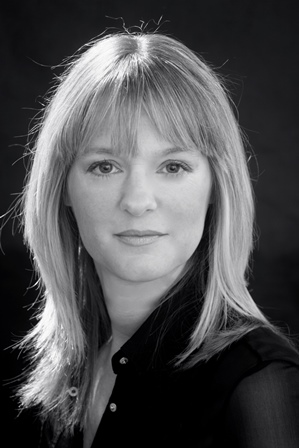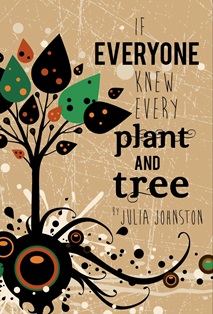The third in a series of five blog posts by Julia Johnston (author of If Everyone Knew Every Plant And Tree) charting her journey from preparing to submit her manuscript to agents, through to the self-publishing of her debut novel.

This week: revising and rewriting for literary agents.
Of the twelve submissions I made to literary agents, two of the four who read the full manuscript were interested. So I chugged up the confidence roller coaster…
There I was in the peculiar and welcome position of two agents giving both positive feedback and much valued suggestions for change at the same time.
Agent numero uno questioned the inclusion of a ‘horticultural’ theme: ‘With the objective of Oliver being relatable to the target audience, I’m afraid I did question his interest in horticulture.’ He advised me, too, that we don’t actually see that much of it going on. He did say, ‘I know the horticulture element gives you this brilliant title, but I’m afraid I do worry about it’.
Agent numero dos suggested I add in more planty/tree-ey type scenes. At least there seemed to be a vague consensus—ensure the theme runs throughout. Though they didn’t agree on the inclusion of the theme, wonderful to have two excellent literary agents offering similar recommendations.
Uno asked that I work exclusively with him—‘If you want to revise the novel along the lines I have suggested, then I might suggest you pull it from other agents now.’
He assured me that, although there was no guarantee of being taken on, it meant he was ‘very interested.’ There were novels with his title and his opening line out there, for which he was given no credit, he told me, as the writer had signed with another agent. I agreed to put on hold any communications with other agents and take some time to make revisions. Exciting times, full of promise, rattling up that coaster...
I rocked back and forwards for weeks, assimilating his notes, mulling it all over, planning mentally how to implement changes. Some were smallish and some were big, like changing the age of the protagonist. ‘Now that I'm making Oliver fifteen, would it be okay with you, in the first instance, if I kept the horticultural angle?’
The question was not answered. He didn’t say ‘no’ so I took it as a ‘yes’.
The rewrite was no mean feat. Changing the age of any character affects everything: language, predilections, relationships, emotions etc. You have to more or less start again.
After a month or so tackling the rewrite, I sent it, with racing heart, to Uno.
Two months later, I heard back.
He said he had read half of it, and didn’t think it was, ‘working quite right.’ I know it’s a business, but I can't pretend I wasn't upset that there was not one positive comment in his rejection email. My eyes are stinging now, remembering how I felt.
Six months had elapsed between my initial submission and the email turning me down. And I don’t imagine that’s out of the ordinary. Of the three sentences he wrote in the body of the email (you heard right), one of them was, ‘I’m afraid I still don’t really think the horticulture aspect is going to be interesting enough to the audience.’ I was kicking myself. Had I been too precious about my work?
I truly appreciate the job of literary agents, and I am most grateful for the time and valuable advice from Uno. And I get that rejecting writers, even ones with whom they’ve worked, is par for the course, but... neh, no point in going on about it. Safe to say, the roller coaster more or less buckled and cast me into cactus world (wretched horticultural references!).
Enter Agent Dos, stage left. No, she didn’t snap me up, but wrote a candid and caring email. I’d been agonising over why I hadn’t found myself able to drop the plant/flower/tree theme. It was surely due to my reluctance to play ball, Uno-style, that I wasn't signed up. After all, he had said, ‘…if you want to revise the novel along the lines I have suggested...’
What Dos wrote is, I hope, enlightening for any would-be-author at the stage of working alongside a literary agent.
Dear Julia,
I think with changes you have to remember that this is your book – if something feels wrong, don’t think that just because someone else suggests something that it’s automatically right; we’re just another opinion (hopefully informed by the market, but ultimately still just a person with personal tastes). Books about children dealing with [themes] are out there so you need to make yours stand out – the most convincing way to do this is the voice of the main character through your writing, and if Oliver’s plant and tree interest gives him something unique, then my advice would be to keep it.
I might be kicking myself soon when I see your publication announced!
All best
Agent Dos
I do truly appreciate the invaluable assessment and suggestions from both the above agents. In effect, they spent precious time on my novel with no reward, so for that, I am truly grateful.
Ultimately, the experience drove me to 'grow' as a writer in a commercial world. You’ve got to be brave, bite the bullet, and get on with it.
What about you, dear fellow writers—any meaty rejection tales? Would love to hear other stories of being led up the garden path only to be flung into nettles. ('Fly further off, hapless plant and tree theme...!')

Writing tips:
TIP 1
Take thinking time, but be brave! (a rewrite might be the hardest thing you’ll ever do, but it’ll be worth it…)
TIP 2
Remember it is your book! (suggestions are just that)
TIP 3
Be grateful and forgive! (easy to be embittered, but an agent’s opinion is not a wrong-doing)
Some suggested reading:
‘Write to be Published’ by Nicola Morgan, reveals the workings of publishers’ minds, along with other gems of information and advice.
‘The Ramblings of a few Scattered Authors’
Find out more about Julia on her website and follow her on Twitter. Find out more about her debut novel here. You can also find her on Goodreads.
Ditto with Kate :-)
I'm enjoying your series of blogs.
Changing the age of the protagonist sounds like a huge change. As well as changing so much in the content of the novel, it also changes who is likely to read it.
Thinking of my own children's reading habits, they never seem to choose to read about someone younger than them.